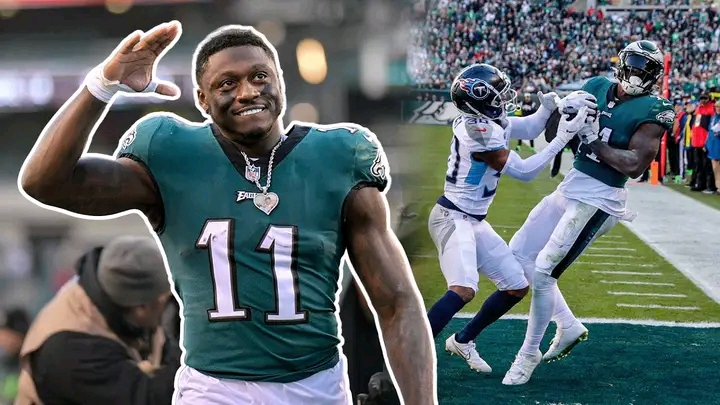NEWS
SO SAD: Philadelphia Eagles Wide Receiver A. J. Brown has been suspended and banned from football activists by NFL Officials as he was tested and found positive of….

SO SAD: Philadelphia Eagles Wide Receiver A. J. Brown has been suspended and banned from football activists by NFL Officials as he was tested and found positive of….
In a stunning turn of events, Philadelphia Eagles wide receiver A.J. Brown has been suspended by the NFL and banned from participating in any football-related activist events after testing positive for a banned substance, sources confirmed late Friday. The suspension, coming at a critical juncture in the season, has shocked fans, teammates, and the football world at large. The NFL’s decision, which also includes a ban on Brown from any future participation in football activism events, has sparked a wave of questions surrounding the league’s anti-doping policies, athlete conduct, and the ongoing intersection of sports and social justice activism.
Brown, who has been one of the most dominant wide receivers in the NFL since joining the Eagles, was informed of the suspension following routine drug testing during the regular season. Though details surrounding the specific substance Brown tested positive for have yet to be fully disclosed, the news has left many stunned, given Brown’s reputation not only for his athletic prowess but also for his vocal advocacy on social issues.
The NFL’s official statement regarding Brown’s suspension was relatively brief but confirmed that the test results showed a violation of league policies on banned substances. While the NFL did not release the specific substance involved, it was noted that it was not related to performance-enhancing drugs (PEDs), leading many to speculate that it may be related to recreational drugs or an illegal supplement.
“We take any violations of our substance abuse policy very seriously,” said NFL Commissioner Roger Goodell in a statement. “A.J. Brown’s suspension reflects our commitment to upholding the integrity of the league and ensuring that all players adhere to the rules and regulations in place. Mr. Brown’s case is currently under review, and he will be suspended from both team activities and football activism events until the matter is resolved.”
The NFL’s strict anti-doping and substance abuse policies have long been a cornerstone of the league’s efforts to maintain fairness and protect players’ health. While the specifics of Brown’s case remain under wraps, the suspension has raised broader questions about the NFL’s handling of off-field issues and the growing role of player activism in professional sports.
Picture background
Banned from Football Activist Events
In addition to the suspension from playing, the NFL also banned A.J. Brown from participating in any future football-related activism events, a decision that has stunned many. Brown has been a prominent figure in the movement to address racial inequality, promote social justice, and advocate for mental health awareness within the NFL and beyond. His advocacy has earned him praise from both fans and peers alike, and he has been actively involved in several initiatives aimed at improving conditions for minority communities.
The NFL’s decision to bar him from these activism events has led many to question the league’s commitment to supporting player-driven social change. Brown has been a vocal proponent of using the platform of professional football to create positive change, especially in the areas of racial justice and education. His absence from these important discussions will leave a noticeable void for many in the activist community.
“A.J. has been an incredible voice for change, especially for young people of color who look up to him,” said NFL player-activist Malcolm Jenkins, a former teammate of Brown’s. “This is a tough situation. I hope this doesn’t silence his voice, but it’s clear that the NFL needs to reconsider how they’re handling this. Athletes should be able to advocate for what they believe in without fear of being silenced.”
Brown’s involvement in activism has been particularly important in the fight for racial equality in the U.S., where he has participated in peaceful protests, advocated for criminal justice reform, and worked with organizations that support underserved youth. His ban from activism events is seen by many as an unfortunate step backward, especially as more and more athletes are using their platforms to speak out on societal issues.











